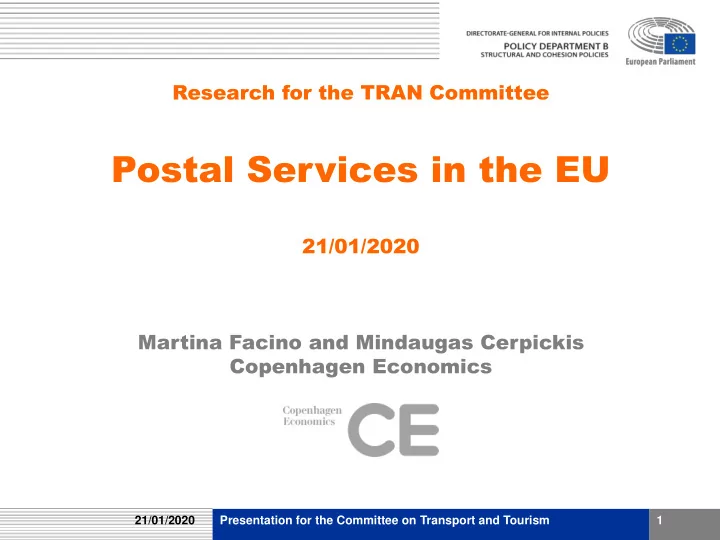

Research for the TRAN Committee Postal Services in the EU 21/01/2020 Martina Facino and Mindaugas Cerpickis Copenhagen Economics 21/01/2020 Presentation for the Committee on Transport and Tourism 1
Structure of the Presentation 1 Main developments in the EU postal sector 2 Challenges, opportunities and policy responses 3 Recommendations for EU postal policy makers 21/01/2020 Presentation for the Committee on Transport and Tourism 2
1. Main developments in the EU postal sector
Evolution of EU postal regulatory framework Green Paper on the development Second Full market First reduction of Postal Services of the single reduction of the opening for the "reserved Directive "reserved area” market for postal remaining area” (2008/06/EC) services Member States (COM/91/476) 1992 1997 1999 2002 2003 2006 2008 2010 2012 2018 Regulation on Full market Postal Services Third reduction Postal Services cross-border parcel opening for 16 Directive of the "reserved Directive (97/67/EC) delivery services area” Member States (2002/39/EC) (EU) 2018/644 21/01/2020 Presentation for the Committee on Transport and Tourism 4
The postal and delivery sector is significant to the EU economy EUR 1.7 mil 2.4% 80 bil people 21/01/2020 Presentation for the Committee on Transport and Tourism 5
Digital communication is transforming the postal industry Development of domestic volumes, % 200 Parcel and express 150 100 Letter post 50 2013 2019 21/01/2020 Presentation for the Committee on Transport and Tourism 6
The competitive landscape is evolving Digital deliveries? (email, e-banking,..) Letters Parcel & express Universal service providers’ share of domestic Universal service providers’ share of domestic addressed letter deliveries, % parcel & express deliveries, % 100 100 70 60 60 56 53 100 100 100 100 100 100 45 99 97 95 93 91 90 90 89 85 85 85 81 81 32 32 32 78 29 28 25 25 25 22 66 20 18 13 10 5 4 2 2 CY FI HU FR MT UKBE PT LV IT PL EL IE SKBG SI ES DE SE NLRO LV FI NL CZ SI FR HU PT PT MT BE IE SK ES EE IT HR RO PL BGELCYLT 21/01/2020 Presentation for the Committee on Transport and Tourism 7
Financial performance of the incumbent postal operators has been decreasing Development of universal service providers’ profitability in the EU Average EBIT (earnings before interest and taxes) margin -7% 5.3% 5.0% 4.7% 4.6% 3.5% 2013 2014 2015 2016 2017 21/01/2020 Presentation for the Committee on Transport and Tourism 8
More attention is paid to the impact on the environment Grams CO 2 per item, 2016 • Changes in the product x12 mix have important 436 implications for postal operators’ direct environmental footprint • The true net-effect of the postal and e-commerce delivery sector on the environment has not been 36 appraised Letter Parcel 21/01/2020 Presentation for the Committee on Transport and Tourism 9
2. Challenges, opportunities and policy responses
Challenges Changing user needs lead to lower volumes (at different pace in different countries) Sustainability of postal operators is under pressure Challenge to sustain basic postal service for vulnerable users Challenge to relocate postal workers Pressure from other regulation (e.g. environmental regulation for inner city delivery) 21/01/2020 Presentation for the Committee on Transport and Tourism 11
Opportunities Universal service providers’ network Growing New operational and brand value that e-commerce technologies can be leveraged to provide SGEIs 21/01/2020 Presentation for the Committee on Transport and Tourism 12
Policy debates and responses to ensure a sustainable universal service obligation Allowing universal Allowing universal Putting the service providers to service providers to sustainability of the improve efficiency price more flexibly universal service through higher obligation in front of operational flexibility other policy objectives • • • Price increases Compensation Delivery speed & • • frequency Price differentiation Consolidation • Network density • Quality targets 21/01/2020 Presentation for the Committee on Transport and Tourism 13
3. Recommendations for EU postal policy makers
Provide flexibility to ensure that Member States can deal with different issues they are facing Adjust to ensure Subsidise Tame monopoly sustainability Flexibility for MS State Aid Focus on market and universal rules failures (if any) service providers 1 2 3 21/01/2020 Presentation for the Committee on Transport and Tourism 15
Q&A Hard facts. Clear stories. ABOUT COPENHAGEN ECONOMICS Copenhagen Economics is one of the leading economics firms in Europe. Founded in 2000, we currently employ more than 90 staff operating from our offices in Copenhagen, Stockholm, Helsinki, and Brussels. The Global Competition Review (GCR) lists Copenhagen Economics among the Top-20 economic consultancies in the world, and has done so since 2006. copenhageneconomics.dk
Recommend
More recommend